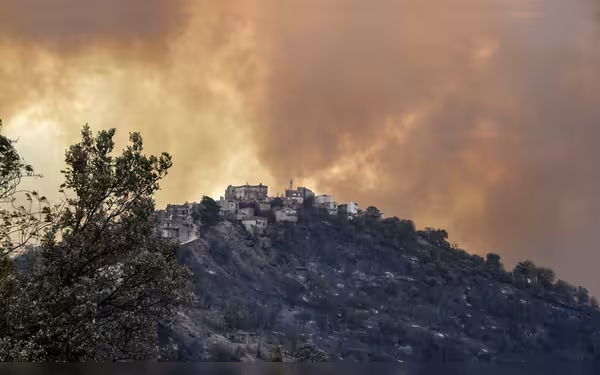Saturday, November 16, 2024 05:34 PM
Algeria's Successful Battle Against Wildfires in 2023
- Algeria prevents wildfire casualties in 2023.
- New laws impose life imprisonment for arsonists.
- Advanced technology enhances firefighting efforts.
 Image Credits: arabnewspk
Image Credits: arabnewspkIn 2023, Algeria successfully combats wildfires with improved strategies, ensuring no casualties and implementing strict laws against arson.
In recent years, Algeria has faced devastating wildfires that have wreaked havoc on its landscapes and communities. The summer of 2023, however, marked a significant turning point in the country’s battle against these destructive blazes. With improved firefighting strategies and equipment, Algeria has managed to tame the flames, ensuring that no lives were lost during this wildfire season, a stark contrast to the tragic toll of previous years.
In the northern mountains of Algeria, particularly in the commune of Ait Mahmoud, the deputy mayor, Mouloud Temzi, surveyed the damage left by the summer wildfires. While fig and olive trees were reduced to ashes and chicken coops were left in ruins, Temzi expressed gratitude that no lives were lost. This is a remarkable achievement in a region that has seen many casualties in past wildfire seasons. Temzi attributed this success to the rapid mobilization of the country’s enhanced firefighting forces, stating, "We have learned how to act during fires, and now we handle them the way the Japanese deal with earthquakes." This proactive approach has proven effective in protecting both lives and property.
The Algerian government has prioritized the revamping of its firefighting measures, focusing on better equipment, updated laws, and increased public awareness. In January 2023, a new law was enacted that imposes life imprisonment for those found guilty of deliberately starting forest fires. This law aims to deter arsonists and protect the country’s natural resources. Additionally, the government has invested in new firefighting aircraft and trucks, significantly bolstering its firefighting capabilities.
Local officials in Tizi Ouzou have also taken specific measures to combat wildfires. They constructed landing pads for heavy-lift helicopters and established watchtowers to monitor fire activity. Furthermore, drones equipped with high-resolution cameras and artificial intelligence have been deployed to identify hot spots, allowing for quicker responses to emerging fires. These advancements in technology and infrastructure have made a noticeable difference in the effectiveness of firefighting efforts.
Despite these improvements, challenges remain. The impact of climate change continues to increase the frequency and intensity of wildfires. Arezki Derridj, an ecologist at the University of Tizi Ouzou, noted that rising temperatures and water shortages are contributing to the problem. As urban migration leads to fewer people managing farmland, the risk of wildfires grows, turning once-cultivated fields into potential tinderboxes.
As Algeria moves forward, it is crucial to maintain and enhance these firefighting strategies. The lessons learned from this summer’s wildfires can serve as a foundation for future efforts. By continuing to invest in technology, training, and community awareness, Algeria can better protect its landscapes and the lives of its citizens. The fight against wildfires is ongoing, but with determination and innovation, Algeria is on the right path to safeguarding its natural heritage for generations to come.













